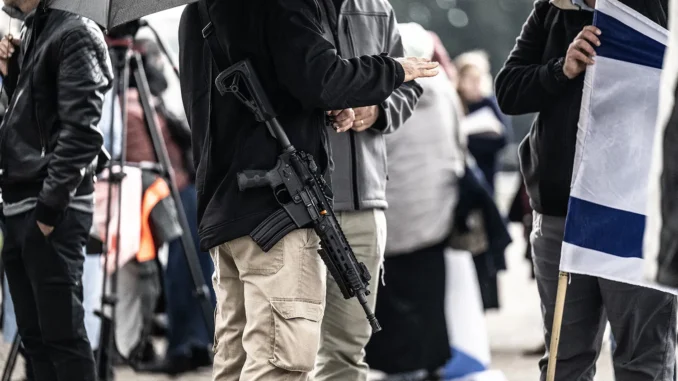
In the wake of Oct. 7, lax gun laws have empowered militias—and the far right.
In the early morning of Jan. 11, a 21-year-old man was fatally shot in the West Bank settlement of Maale Adumim, just across the Green Line from Jerusalem. It was revealed that one of the suspects had recently acquired his gun license, thanks to National Security Minister Itamar Ben-Gvir’s newly relaxed firearms policy.
The fear and tension across Israel since the massacre by Hamas on Oct. 7, 2023, mixed with the troubling turn internal security policies have taken, have created an atmosphere of armed paranoia—and led to the spread of armed militias with little training and an aggressive mindset.
Oct. 7 shattered the sense of personal security across the country, and many Israelis have started to organize their own ad hoc security arrangements in both villages and kibbutzim. This response includes a significant surge in applications for gun licenses, with more than 270,000 Israelis applying between Oct. 7 and Dec. 25. Police officials report a remarkable growth in civilian rapid response teams, which have expanded from 70 units to 900, incorporating more than 10,000 volunteers.
The widespread increase in firearms possession is not solely a spontaneous reaction from a worried populace but rather the result of pro-gun policies championed by the hard right, which have intensified under Ben-Gvir’s influence in the past year. This policy shift toward greater gun accessibility and ownership is a calculated move aligned with the hard right’s agenda, rather than just a direct response to public concern.
Ben-Gvir has advocated for increased private gun ownership, significantly relaxing the country’s traditionally stringent gun control laws and easing the rules of engagement for police officers. Last August, Ben-Gvir publicly commended an Israeli settler for fatally shooting a Palestinian teenager during a clash near the West Bank town of Burqa. After Oct. 7, Ben-Gvir called for a national campaign to give weapons to Israelis. His former cover photo on X, formerly Twitter, said in Hebrew, “Israel is arming!”
“People have lost their sense of security and felt that having a gun would bring it back. Ben-Gvir exploited this to advance his agenda,” said Wisal Raed, the coordinator of a project to combat violence and crime in Arab society at Sikkuy-Aufoq, a Jewish and Arab nonprofit organization.
“We need to go back to 20 years ago, to the Second Intifada,” said Eitay Mack, a human rights lawyer who writes about Israel’s gun industry. “In response to the Intifada, Israel saw a proliferation of security guards in public spaces, from cafes to malls to train stations, with tens of thousands of them armed. Fast-forward to the ‘knife intifada’ [a period of increased Israeli-Palestinian violence starting in October 2015, characterized by numerous stabbing attacks by Palestinians against Israelis] and the late 2010s, when then-Internal Security Minister Gilad Erdan passed a law lowering the bar for who can get a gun. Then, in the last elections in November 2022, Ben-Gvir ran on relaxing these laws even more. For the hard right, weapons aren’t a pragmatic necessity but an ideological belief.”
Ben-Gvir’s agenda was clear long before Oct. 7. After he took office in late 2022, he ordered the police to abolish the practice of requiring citizens involved in an attack to hand over their personal weapons for extended examination and investigation. During the protests that swept Israel in 2023, Ben-Gvir worked to oust Tel Aviv District Commander Ami Eshed, whom he saw as siding with anti-government protesters. Meanwhile, Israel saw its deadliest year on record among Arabs, with 244 killings attributed to crime and protection issues—six times the number among Jews—and a mere 10 percent solve rate, less than half the solve rate for cases involving Jews.
“Ben-Gvir has deliberately weakened the police to establish a ‘national guard.’ The privatization of law enforcement leaves citizens with no choice but to protect themselves,” Mack said.
For Ben-Gvir and his allies in the gun lobby, Oct. 7 was an opportunity. The new regulations initiated by Ben-Gvir have significantly reduced the criteria for obtaining firearms. Among other measures, they allow volunteers in rescue organizations (such as Israel’s national medical emergency, disaster, ambulance, and blood service) to obtain gun licenses; lower the certification threshold from “Rifleman 07” (a soldier who’s skilled in combatant training and advanced weaponry) to “Rifleman 02” (a noncombat soldier who has gone through basic training); and permit, from the age of 27, even those who have not served in the Israel Defense Forces (IDF) and reside in eligible settlements (those near the Gaza border, including Ofakim, Netivot, and Sderot) to acquire a handgun license. Licensing regulations have been loosened, and in-person interviews are no longer required.
Members of kibbutzim and moshavim can now obtain handgun licenses through their agricultural associations. This move, alongside the establishment of hundreds of rapid response teams equipped with rifles, has created a sense of an “arming nation.”
In a Jewish Power party meeting last October, Ben-Gvir doubled down on his gun policies, saying, “The war’s onset confirmed our belief: Having a weapon in every location can save lives.”
But guns aren’t for everyone. The licenses of several members of the anti-Netanyahu group “Brothers in Arms” were taken away for “conspicuous reasons,” with members saying they were targeted for their anti-government stance.
Ben-Gvir also put out a directive permitting police to use live fire against those blocking roads, thereby hindering the movement of IDF personnel and access to settlements. Critics of this directive argued that it was meant to target anti-government protesters and Arab communities. When Arab members of Israel’s parliament, or Knesset, planned a protest to call for a cease-fire, they were detained by the police.
The new militias—and their weapons—are visible on the streets, to public alarm. Tel Aviv council member Tzipi Brand sent a letter to Mayor Ron Huldai protesting the actions of rapid response units that arbitrarily stop Arab residents, causing terror among the population. One of these units includes “The Shadow,” a rap artist with extreme-right views and a notoriously violent following.
Crime is also up. In early 2024, a woman was sexually assaulted at gunpoint allegedly by a man who had obtained his weapon after Ben-Gvir loosened regulations.
Guns have also not proved effective even in stopping terrorism. On Nov. 30, 2023, a shooting attack at the entrance to Jerusalem resulted in the deaths of four Israelis, including a tragic case of mistaken identity. Yuval Doron Castleman, a 38-year-old lawyer from Jerusalem’s outskirts, was among those killed. Castleman, who was at the scene, used his weapon to engage the attackers. However, in a distressing turn of events, he was mistakenly shot by Aviad Frija, a reservist soldier.
When the soldiers arrived, Castleman knelt down, discarded his weapon, and identified himself as Israeli, yet Frija, who is linked to the Hilltop Youth—a group of young extremist settlers—fatally shot him. Frija served in the “Sfar Hamidbar” (“Desert Frontier”) unit, a military group formed to integrate Hilltop Youth members into army service in the West Bank. This unit has faced scrutiny and is under investigation for alleged torture of Palestinians and violence against leftist activists.
Frija was initially placed under house arrest but was released in early January amid a controversial investigation. Although the police initially stated that an autopsy was unnecessary, Castleman’s body was later exhumed when the Military Police disagreed and determined it was needed. The subsequent examination revealed bullets from an M16, the same make of Frija’s gun.
Prime Minister Benjamin Netanyahu, already condemned by many Israelis for the security failures leading up to Oct. 7 and the subsequent handling of the war, has faced additional criticism for his perceived dismissive reaction to Castleman’s death. Responding to a question about the accidental killing, Netanyahu remarked, “That’s life.”
Following the shooting, the IDF clarified that its engagement rules prohibit shooting at suspects with raised hands. They announced the “preliminary arrest” of Frija, who later said he acted in self-defense.
“Reservists didn’t used to take guns off the base,” Mack said. “It’s a result of the chaotic environment coupled with right-wing policies. Rapid response units are supposed to be linked to the police. They are supposed to train them. But with so many units and so many weapons, the police can’t oversee all [of] them.”
With so many guns and groups of citizens organizing, there’s a concern that some of these guns are falling into the hands of fringe right elements: Rafi Kedoshim, a member of the Likud party who has a history of incarceration and is alleged to be the head of a crime family, runs a rapid response biker unit. Moshe Ben Zikri, associated with the Jewish Power party and known for his right-wing activism, also leads a rapid response team. Ben Zikri, who has been arrested for protesting LGBTQ Pride events and interfaith marriages, heads a unit that the mayor of Harish says has become uncontrollable and refuses to cooperate with municipal authorities. Another group, the Barel Unit, was established by Jewish Power MK Almog Cohen to bring “security back to the Negev.”
For Arabs in Israel, the civilian arms race is particularly terrifying because the incitement against them is coming from the top, whether from Netanyahu, who in 2015 claimed “droves of Arabs” were heading to the polls to oust him, or Ben-Gvir, a Kahanist who was convicted of racist incitement, or Cohen, who made animal noises at Arab MKs during a parliamentary session last year.
Arab-Jewish relations in Israel have always been fragile, but since Oct. 7, they have reached a critical point. Many Arabs perceive increasing hostility from higher authorities, as shown in the recent arrests of Arabs over social media posts and likes. These incidents contribute to a growing sense of unease among everyday Arabs, who feel threatened in a public sphere brimming with firearms. “It feels like all these weapons are aimed at me,” said Raed, the Sikkuy-Aufoq coordinator.
Scrutiny over Ben-Gvir’s policies has been mounting. In late November, the Israeli daily Haaretz reported that the Ministry of National Security had improperly appointed staff to approve gun licenses. In response to the high demand, Ben-Gvir had called for an increase in the number of clerks in the Firearm Licensing Department to process these licenses.
The responsibilities of these clerks include assessing the physical and mental fitness of applicants and verifying their training. But it turned out that training was inadequately short, lasting only one day instead of the usual month, and was done from within the ministry. Following these revelations, Yisrael Avisar, the head of Firearm Licensing Department, resigned.
Ben-Gvir also came under scrutiny from the White House when pictures of him distributing assault rifles to civilians at a political event were circulated online. In response, the White House delayed a shipment of thousands of U.S.-made rifles, worried that they would fall into the hands of settlers.
In early 2023, MK Mickey Levy of the Yesh Atid party petitioned Israel’s High Court against a law expanding Ben-Gvir’s powers over the civilian police. Following the Haaretz revelations, Levy and MK Gilad Kariv of the Labor Party also called on Attorney General Gali Baharav-Miara to consider a criminal investigation regarding the issuance of licenses in the Ministry of National Security.
The widespread availability of guns raises the alarming prospect of political violence, including by the police, which has intensified over the past year due to the movement against judicial reforms and the war. Recently, right-wing protesters have been targeting the families of hostages, accusing them of undermining Netanyahu’s government. The day after the war ends will not mean an end to violence in Israel.



